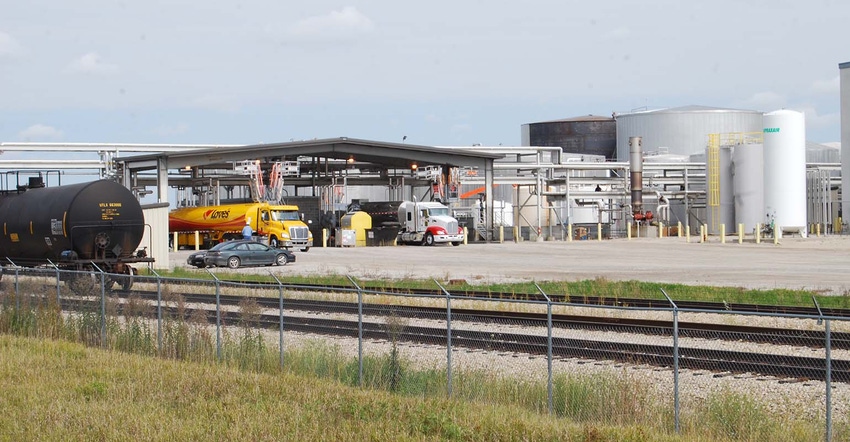October 16, 2017

The U.S. Environmental Protection Agency recently requested public comments on a proposal to lower the 2018 and 2019 Renewable Fuel Standard (RFS) biodiesel levels. The Iowa Renewable Fuels Association, Growth Energy, the National Biodiesel Board, the Iowa Biodiesel Board, the American Soybean Association and others are calling on all biofuels supporters to respond. These groups have launched online portals to make it easy to be heard. They urge you to do this now, as the public comment period closes Oct. 19.
“EPA should be increasing the proposed 2.1 billion-gallon biodiesel level, not seeking to cut it further,” says IRFA executive director Monte Shaw. “In 2016 the country used 2.9 billion gallons of biodiesel. With biodiesel use on the rise year-after-year it is counter to the intent of the RFS for EPA to take a step backward. With many Iowa plants running below capacity, there is no doubt the U.S. biodiesel industry can easily rise to the challenge of higher volumes.”
Biofuel supporters can make their voices heard
Several news outlets have also reported EPA is considering allowing exported gallons of ethanol to count toward the 15 billion-gallon RFS level for ethanol. This would result in more than a one billion-gallon drop in domestic ethanol use, says Shaw. IRFA’s petition urges EPA to drop this illegal notion and to incentivize domestic blending for U.S. ethanol.
Renewable fuels champions wishing to sign a petition supporting biofuels can go to iowarfa.org/dont-cut-rfs. National Biodiesel Board officials are also urging supporters to contact EPA by phone and/or email. Visit www.biodiesel.org or www.nbb.org to find out more. Click on the “Fueling Action” icon to submit a pre-drafted letter or personalized comments to the agency by Oct. 19. Or, you can contact the White House by phone or by email by visiting https://www.whitehouse.gov/contact.
A showdown is looming on Capitol Hill
Sen. Chuck Grassley (R-IA) and several other senators plan to meet with EPA administrator Scott Pruitt on Oct. 17 to voice disappointment with EPA’s latest attempt to gut the RFS and biodiesel. Grassley announced the meeting last week during a press conference and rally at Renewable Energy Group’s (REG) biodiesel plant at Newton, Iowa.
Grassley said Pruitt’s recent proposal to slash biodiesel volumes is contrary to assurances Pruitt made to uphold President Donald Trump’s repeated promises to support renewable fuels. “We will make it very clear where the president is coming from and what Pruitt told us in January during his nomination process,” Grassley said. “Stick to your word. A platform isn’t just something to run on, it’s to stand on.”
Iowa’s senior senator told the standing-room-only crowd of more than 70 farmers and biofuel advocates, including many Iowa Soybean Association leaders, he intends to do everything in his power to make that happen. Grassley believes the Oct. 17 meeting, which he is spearheading, will get Pruitt and the EPA “back on track.”

CALL TO ACTION: Dozens of biofuel supporters, including Sen. Charles Grassley of Iowa, signed a banner at a recent rally at the REG biodiesel plant, urging president Trump not to let the EPA break Trump’s promise to support renewable fuels.
CALL TO ACTION: Dozens of biofuel supporters, including Sen. Charles Grassley of Iowa, signed a banner at a recent rally at the REG biodiesel plant, urging president Trump not to let the EPA break Trump’s promise to support renewable fuels.
Grassley flexes political muscle for biofuels
“My confidence level is based on what the president has said in a couple conversations I’ve had with him,” Grassley said. “The president is the chief executive and Pruitt works for him and the American people. He has to listen to his boss.”
EPA put out a Notice of Data Availability (NODA) Sept. 26 requesting comment on options for reducing 2018 RFS requirements that were set last year. EPA asked about the possibility of lowering targets by 315 million gallons for biomass-based biodiesel and 473 million gallons for advance biofuels and total renewable volumes. EPA cited:
Previously set targets may not be attainable due to the expiration of the federal biodiesel blenders tax credit last year.
A reduction in renewable diesel imports from Indonesia and biodiesel from Argentina because of new anti-dumping duties.
Both could translate to higher fuel prices.
In July, EPA proposed reducing the 2019 advanced biofuel mandate, which is the predominant contributor, by 40 million ethanol-equivalent gallons. The biomass-based diesel proposed volume was flatlined. The NODA also seeks comment to reduce 2019 levels, potentially back to 1 billion gallons.
Gutting the RFS would hurt rural America
Grant Kimberley, Iowa Biodiesel Board executive director, also spoke at the rally. He said the RFS reductions would be devastating. “Gutting the RFS would worsen the struggle farmers are already facing and could push us deeper into an ag recession,” he said, noting soybean oil is the most common feedstock. “I urge President Trump and EPA not to buckle to the interests of big oil companies, but stay true to promises made on the campaign trail to benefit rural communities and all Americans.”
Another speaker was Ron Heck, a longtime biodiesel advocate and an Iowa farmer who serves on both the Iowa and the National Biodiesel Boards. He said watching the growth of the biodiesel industry is one of his greatest joys in public service. He asked farmers, renewable fuel supporters and anyone who eats — biodiesel reduces feed costs, thus food costs, Heck said — to tell the EPA and Congress not to mess with the RFS. The RFS was signed into law by President George W. Bush to expand the nation’s renewable fuels sector and reduce the reliance on imported oil.
“We need to make a little more noise and make sure the EPA does what it says it would and follow the law,” Heck said.
“It’s on ongoing battle,” said Brad Albin, vice president of manufacturing for REG. The company is the nation’s largest biodiesel producer with 11 plants in the U.S. and two in Germany with more than 400 million gallons of capacity. Albin is confident EPA will back down. “We’re a tenacious group, the U.S. biofuels industry and farmers,” he said. “We have a great product and we will fight for it.”
About the Author(s)
You May Also Like






